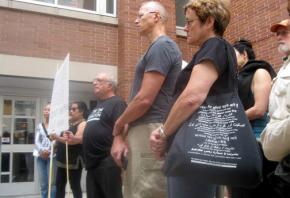Ali Abunimah won’t be silenced
explains how activism and public pressure won over censorship when Evanston Public Library tried to cancel a speech by the Electronic Intifada cofounder.
A FEW months ago, Neighbors for Peace, an organization of antiwar activists based in the Chicago suburb of Evanston, Ill., began talking with Ali Abunimah and the Evanston Public Library about bringing the Electronic Intifada founder to speak on his newest book The Battle for Justice in Palestine.
What should have been a routine speaking engagement at a local library started making headlines when, according to Abunimah, the library sent an e-mail August 1 telling him that he couldn't "be allowed to speak at Evanston Public Library without [an] Israeli speaker to ensure balance."
Organizers with Neighbors for Peace, which was co-sponsoring the event, believe the library's director, Karen Danczak Lyons, who they know personally as a supporter of progressive causes, came under pressure from a "higher authority" to censor Ali. The following day, Evanston Public Library canceled the event and removed it from its calendar of events.
Abunimah found out about the cancelation from social media when the library posted on Twitter, "With this complex issue, we plan to schedule more speakers on other dates, too."

Within hours, activists in the Chicago area launched a social media and call-in campaign. People bombarded the library's Facebook and Twitter with messages condemning the blatant censorship. A read-in was planned, and Neighbors for Peace began organizing for a press conference and a later protest.
Educators and library professionals from around the country, like Sarah Roberts, an assistant professor at Western University, weighed in to say that the cancelation violated freedom of information and speech. Roberts wrote:
In addition, it is my belief that the canceling of this event falls very much afoul of the ALA [American Library Association] Bill of Rights' article governing such practices. Suggesting that "balance" is the issue, particularly after the event has been scheduled, is not an appropriate nor adequate reason for cancellation.
The U.S. Campaign for the Academic and Cultural Boycott of Israel asked, "Would the Evanston Public Library insist on inviting a member of the Ku Klux Klan to present the 'other side' of a presentation by Cornel West?"
Under the intense community pressure, Library Director Lyons spoke with Abunimah on August 4, and the event was reinstated for its original date of August 11.
THE EVENT was packed. Nearly 200 people jammed into the library, with a huge overflow crowd watching the live-stream at the nearby Lake Street Church, where even that venue was standing room only.
Abunimah said that on a personal level, this was one of his most moving and powerful presentations on Palestine. He discussed how Israel's destruction of Gaza during Operation Protective Edge was part of a much larger campaign to ethnically cleanse Palestinians from greater Israel. He detailed the political and economic destruction of the siege of Gaza, and how Palestinians' daily lives are impacted, as well as their rights to resistance and self-defense.
There wasn't a large Zionist presence at the event, though one attendee spoke up during the question-and-answer section to claim that "Israel spent a lot of money trying to build up the economy in Gaza and the West Bank in the 1990s"--and that "a lot of the situation today in Gaza...is a result of violence that was launched from Gaza."
Abunimah replied that this was a "masterful recitation of talking points that we've been hearing for years. Like a salad made with a few facts from here, you took a little bit from there, and you make a salad...That was a very delicious salad, but empty of calories completely...This is why I hope people pick up the book...because the good thing about this book is that it's fully documented."
Libraries are public institutions with a role to play in protecting free speech. Ali Abunimah and the communities of Evanston and Chicago showed us what to do in the face of censorship and how to reclaim our public institutions. Without passionate and vocal support from numbers of people, this space to talk about Israeli apartheid and the ethnic cleansing of Palestine might have been closed off.


